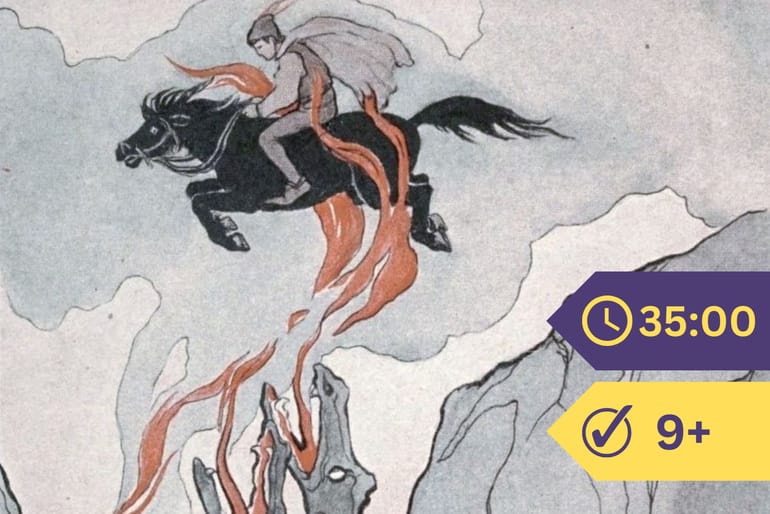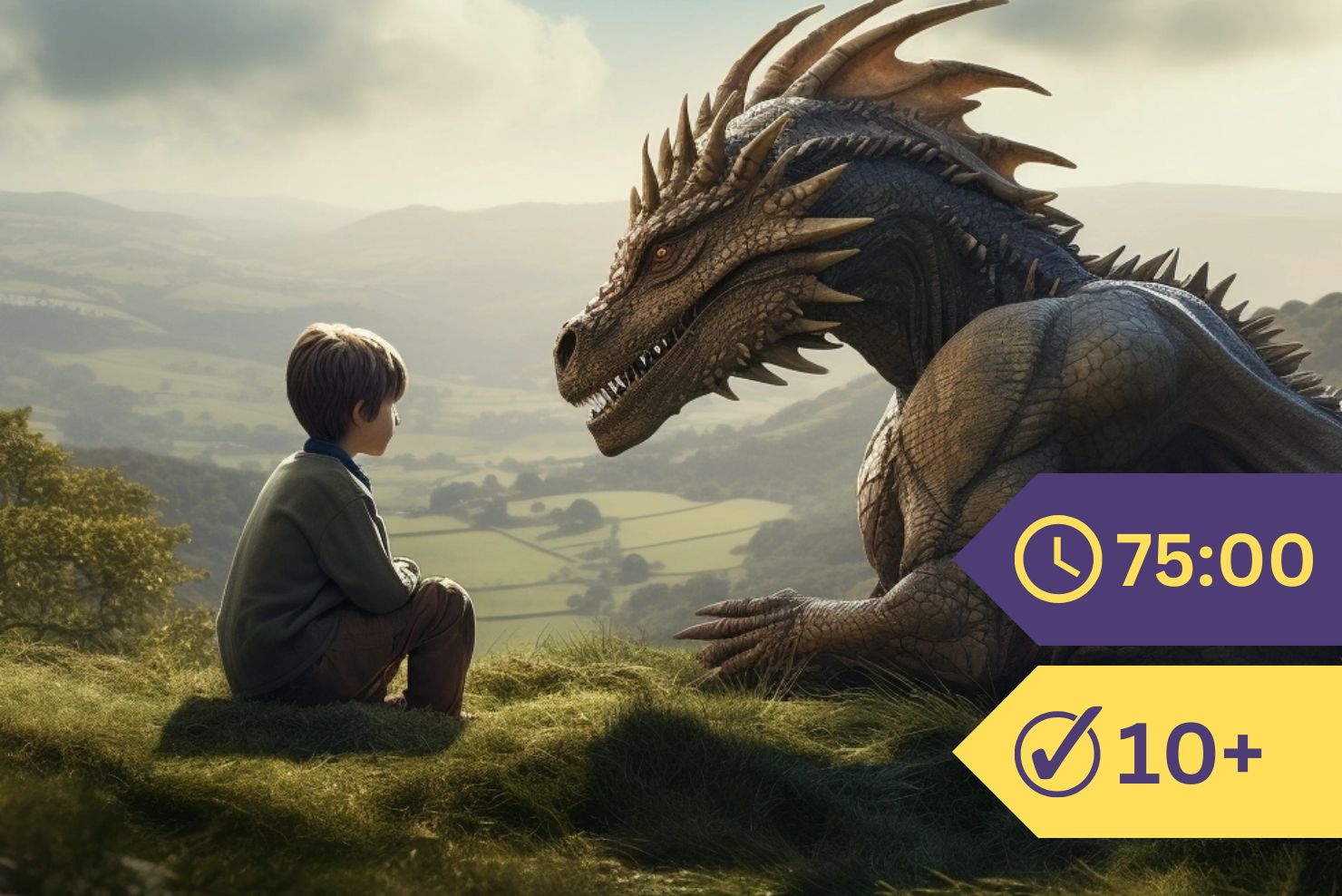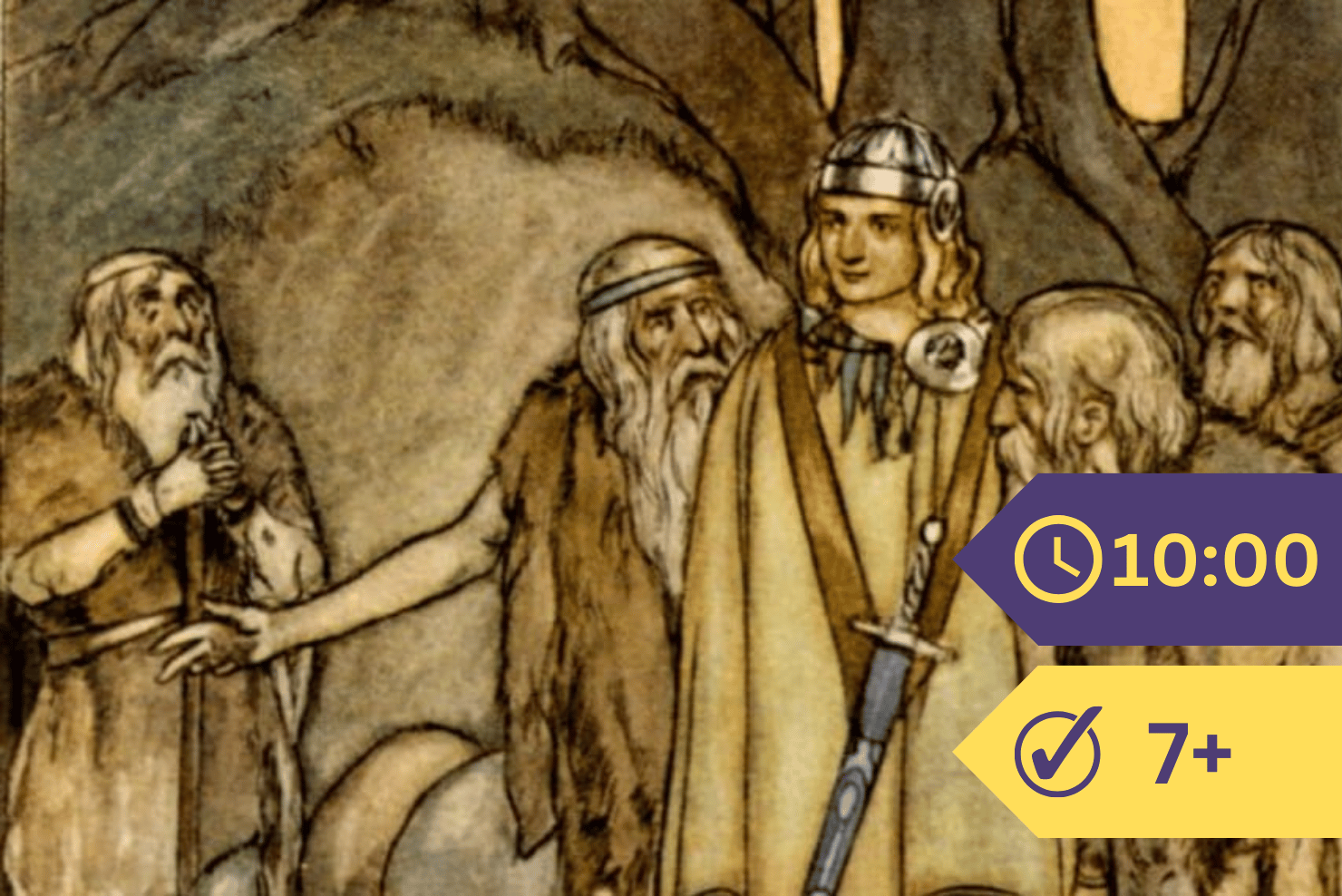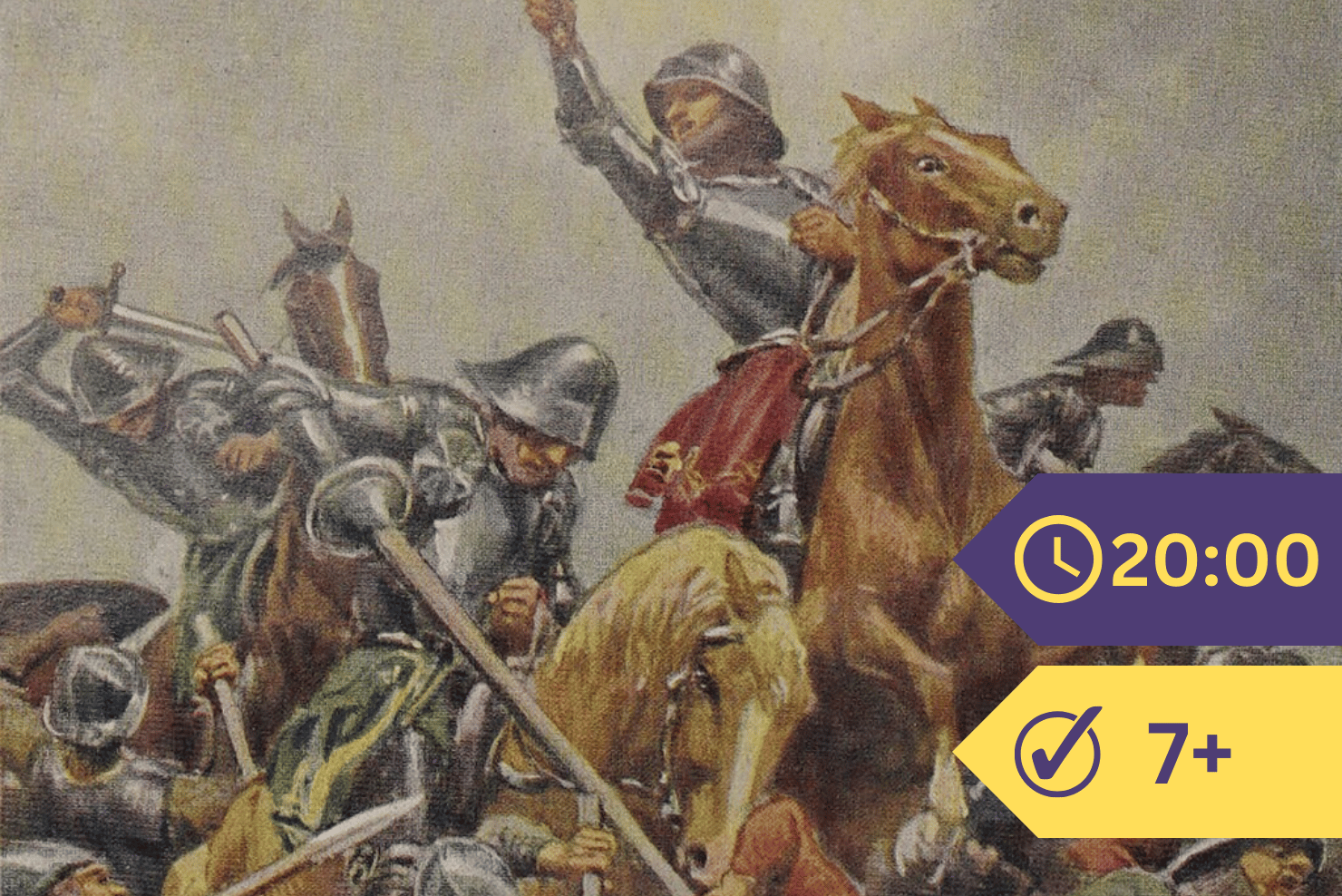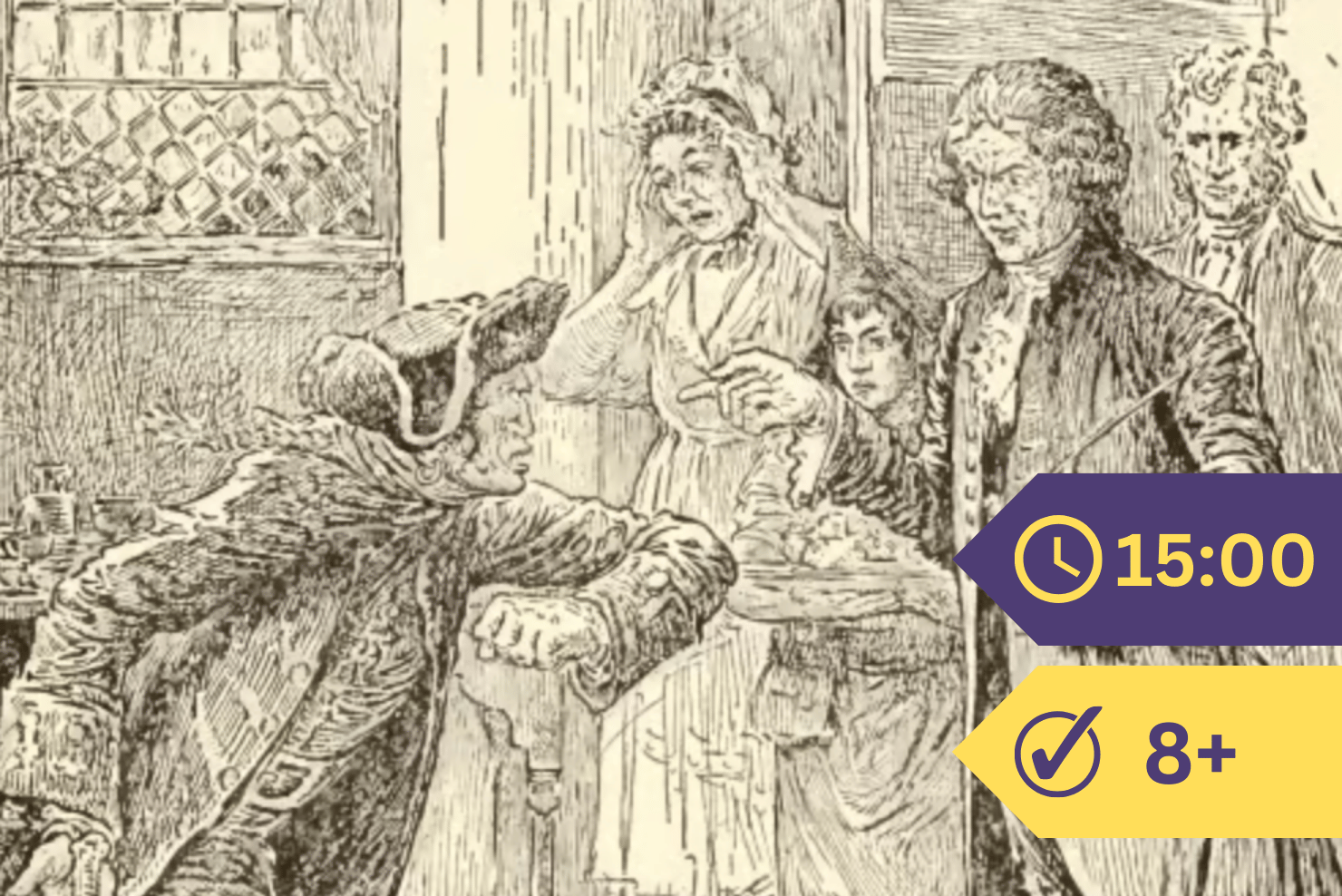King Conn of Ireland had a noble son named Conn-eda, and he was truly the apple of his father’s eye, none more precious to him.
His mother had died when he was a child, and after a while his father, the king, married again. He married the youngest daughter of his high priest. But the truth is that he didn’t marry her because he loved her. He married her because his counselors told him it was wise for him to do so, for her father the high priest was very powerful.
The new queen was a cruel woman, and her hatred of Conn-eda was bitter and deep. She hated him because he was so handsome and kindhearted, and she hated him because he was so dear to his father, but most of all she hated him because everyone looked to him as the one who would one day become their king, which soon would happen because his father was old and weak.
After a while the young queen had a son of her own, and then she hated Conn-eda more than ever and plotted how to get rid of him, for she wanted the kingdom to belong to her own son.
At the back of the castle there lived a woman in a poor little shack, and it was said that she knew a lot about magic, and everyone was afraid of her. She was the hen-wife and was in charge of all the chickens belonging to the castle. She was a beautiful woman but a little strange, and no one could tell whether she was young or old.
One day the queen went alone to the hen-wife’s hut, for she wanted to ask her advice. She was a little embarrassed to go, because the woman was a sorceress.
“Queen Durfulla,” said the hen-wife, “I know why you have come to me and what you want.”
That surprised the Queen and she said, “Then what do I want?”
“You want to rid yourself of young Conn-eda and you’ve come here for advice. But I’m not one to give something for nothing. What reward will I get if I give you my advice?”
“What reward do you want?” the queen asked.
“It’s not so much and not so little. Give me enough wool to fill the gap between my arm and body when I put my hand on my hip with my elbow out, and give me enough red wheat to fill the gap that I shall drill with my spindle. Then I will advise you for your questions.”
Well, the queen must have smiled at that, for it seemed like only a small reward the woman asked for, and she gladly agreed to give it.
“Then have the wool and wheat brought here tomorrow,” said the hen-wife. “Twenty cartloads of wool and twenty cartloads of wheat will be enough to fill the hollow between my arm and body and the hole I shall make.”
The queen thought this strange and wanted to say that the hen-wife was dreaming, but still the next day she stood at the door of the hen-wife and close behind her came twenty cartloads of wool and twenty cartloads of wheat. The horses pulled the carts and the wagoners cracked their whips.
The hen-wife stood in the doorway with her hand on her hip and her elbow out, and the men took an armful of wool and put it in the hollow of her arm, but the wool fell through the hollow into the house. They put another armful between her arm and body, and the same thing happened. Only when the house was so full of wool that it couldn’t fit in any more were they able to fill the crook of the hen-wife’s arm while she was still standing in the doorway.
“And now the wheat,” said the hen-wife.
Then she led them to her brother’s house, which was nearby, and climbed onto the roof. The roof was made of peat, and she drilled a hole through the peat with her spindle stick, so that as soon as they poured the wheat into the hole it spilled into the house, and only when the house was so full that nothing could fit in it could they also fill the gap.
“Now I am satisfied,” said the hen-wife, but that was more than the queen could say for herself, for she was a mean woman. However, if the hen-wife could tell her how to get rid of Prince Conn-eda, it would be worth more to her than all the wheat and wool ever grown.
“Now listen carefully to what I tell you,” said the hen-wife. “You have paid me faithfully and in full, and I am also willing to fulfill my part of the bargain. Far enough from here is a great dark lake, and its name is Lough Erne. Beneath its waters lives the king of the Fiborg race, a race happiest when it lives in the water. There, in the king’s garden, grow three golden apples. In his stable there is a great black horse. In his castle lies the puppy dog Samur, and the magic powers that dog has are great. You must send Conn-eda to get these things for you and bring them back in a year and a day and there is no living thing that can seek those things without losing his life in the search unless he has magic to help him.”
“But how can I send Conn-eda?” asked the Queen, “for he is no longer a child to do my bidding.”
“I’ll tell you that too,” replied the hen-wife.
She then took out a chessboard and chess pieces and handed them to the queen. “Take these home,” she said, “and call Conn-eda to come and play a game of chess with you. I put a spell on the chess pieces and I put a spell on the board, so you can be sure that you win; but before you play you must agree with the prince that whoever loses must do something for the winner, and what you shall ask of him is that he restore to you the three things I have told you about. But make sure you only play that one game, because after that is played, the magic power disappears.”
The queen was pleased with the hen-wife’s advice, and she took the chessboard and chess pieces, promising to do whatever she was commanded. Then she hurried back to the castle.
As soon as she got home she sent for Conn-eda to play a game of chess, and he came at her command and sat down at the board with her.
“It is not for nothing that we play together today,” said the Queen, “whoever loses must do something for the other, and the winner may demand what he wants.”
Conn-eda agreed. He had it in his mind that the queen was planning a ruse against him, but he was not afraid of her, for he made sure that he could beat her in the game.
So they sat down to play, and Conn-eda was a good player, and the queen was a much lesser player, but it seemed as if a mist hung over the prince’s eyes, and when he thought that once he had had made a mistake, he discovered that he had made more mistakes, and a little later saw that he had lost the game and that the queen was the winner.
Then the queen laughed aloud and pushed the board away. “The game is mine, Conn-eda,” she cried, “and you have to do as I please. Whatever I ask, you must do it, no matter how hard it is.”
When the prince heard that, his heart was troubled, and he said to her, “What do you demand of me?”
“The following,” replied the queen. “Within a year and a day you will bring me three golden apples, and a great black horse, and the magical puppy-dog Samur and they all belong to the king of the Fiborg people. He lives at the bottom of Lough Erne, but where that is I don’t know, and you must find it yourself.”
When Prince Conn-eda heard that, he knew that the Queen had indeed cheated him, and that she really wanted to take his life. But he feigned and hid his fear, saying, “I will, if it be in the power of mortal man to do so. And now we shall play one more game, and again it shall be that the loser must do what the winner says.”
The queen was so delighted that she forgot the hen-wife’s warning and triumphantly and willingly agreed to play with Conn-eda one more time.
But now the magic was gone from the board and this time the prince was the winner.
When the Queen discovered she had lost, her face turned pale and her heart sank.
“You won, Conn-eda,” she said. “And what do you want me to do for you?”
“The following,” said Conn-eda. “During the year and day that I am gone, you must sit on the top of the highest tower in the castle and eat nothing but as much red wheat as you can pick up with the tip of your spinning stick.”
That was a hard fate for the Queen, but after all it would only be for a year and a day, and at the end of that time she would be free again and rid of Prince Conn-eda forever, so the deal was not as difficult as it seemed at first. So the queen went up and took her place in the high tower, and the prince mounted his horse and rode into the world in search of the golden apples, the big black horse and the magical puppy-dog Samur.
But first Conn-eda went to a wise man he knew who was a friend of his. Many many favors the prince had done for him, and now it was time to ask for one in return.
The wise man heard Conn-eda galloping to the house and came out to meet him, and the prince dismounted his horse and greeted him respectfully.
“I’m in big trouble,” Conn-eda began, “and I’ve come to see if you can help me.”
“I saw it right away in your face,” replied the wise man, “and you better start at the beginning and tell me the whole story, for it is not until I hear it all that I will know how to best help you.”
So the prince told the wise man the whole story from beginning to end. He told of the Queen’s hatred for him and of the ways she had tried to hurt him; he told how she had asked him to play chess with her, and how he had feared her and yet had no doubts about winning the game; and he told how in some strange way he had become the loser, and how the queen had claimed an act from him, and what she had claimed.
“And we played again, and that time she lost”; and he told what he had demanded of her.
“And it was no more than what she deserved,” said the wise man. “I have no doubt that the Queen has tried to make you lose your life in this trade, and it was a clever mind who devised this trick. There is someone else behind it than the Queen.”
He thought for a moment and then spoke again. “There is only one person who could know about the golden apples, the great black horse and the magic dog Samur, and that is the wise woman who lives in the shack at the back of the palace. She calls herself a hen-wife, but in reality she is Carlleach of Lough Corib, and the Water King’s own sister. There are four watermen, three brothers and a sister. The first is king of the Fiborgs, and the second is enchanted. The third lives in a house next to the hen-wife, and the fourth is Carlleach himself. And now I will do what I can to help you.”
“Where Lough Corib is I don’t know, but in my stable there’s a little shaggy black horse. He’s not worth looking at, but he’s great in strength. Take him and ride wherever he carries you, and let go of the bridle around his neck so that he can choose his own way. He will lead you to the rock where the Bird of Wisdom sits. Three days, every three years the bird sits there, and little happens in the world where he knows nothing about. This is the time for him to sit on the crag, and if he will talk, he can tell you how to find the lake and the treasures of the Water King.”
The wise man then took a very beautiful and very precious jewel from a box that was on a shelf behind the door and gave it to Conn-eda.
“If the Bird of Wisdom will not speak,” he said, “give him this jewel in his claw, and he may answer you.”
Conn-eda took the jewel and kindly thanked the wise man, and then he went to the stable and led out the shaggy little black horse and mounted him instead of his own fair steed, and indeed the little horse was not impressive. But as soon as Conn-eda sat on his back, he discovered what a valuable horse he was, for away he went lighter than a bird and faster than the wind, Conn-eda had never ridden like that before.
For a long time the shaggy black horse went ahead, and all the while Conn-eda let go of the bridle, leaving the horse free to choose its own course. Then they came within sight of a cliff, and on the cliff sat a great gray bird. It sat so still it could have been part of the rocks, and the eyes in its head were as dull as cold, dead stones.
The horse stopped in front of the rock and asked the prince to talk to the bird. “For it is the Bird of Wisdom that the Wise One spoke of,” said he, “he can tell us what to do now, or we might as well go back the way we came, for we shall never know where the lake is where the king of the Fiborgs lives.”
Then Conn-eda raised his voice and called to the bird. Three times he called, but the bird did not move a feather, but sat still as if he had been carved out of the rock.
Then the shaggy steed said, “Give the jewel, Conn-eda, and perhaps then it will speak.”
The prince took the jewel from his bosom where he wore it and held it up so that it glittered in the sunlight, and again he called to the bird. This time he turned his head and looked at him, and his eyes became bright as if a fire were burning in them. Then he flew down and caught the jewel in his claw and flew back to the cliff with it.
There he sat, opened his beak and cried in a loud voice, “Conn-eda! Conn-eda! Son of the king, I know why you have come and what you want from me. Turn the light down and pick up the stone near the front right foot of your steed. Underneath you will find a ball and a cup. Pick them up as you will need both of them. Roll the ball in front of you and follow it wherever it leads you. It takes you where you want to go. You’ll need the cup later.”
Then the Bird of Wisdom closed its beak and the light went out from its eyes, and again it sat as still and gray as if it had no breath of life in it.
Conn-eda sat down and looked for the stone the bird had told him about, and he could not miss it for the horse’s right front hoof was against it. He lifted it up and there he found a cup and a ball. The cup he placed in the bosom of his shirt, but the ball he threw in front of him, according to the bird’s request. The ball rolled on and on, uphill and downhill, over swamp and through thornbushes, as Conn-eda on the shaggy steed followed.
After a while it led them to the edge of a lake so dark and deep you’d think there was no bottom. The ball bounced into the lake and disappeared from sight.
The prince was desperate. “What should we do now?” he cried. “If we follow the ball, we will drown in the deep waters of the lake, and if we do not follow it, we will never find the Water King’s palace.”
But the shaggy steed told him to take heart. “We must indeed follow the ball,” he said, “yet it is possible that no harm may come to us. And now sit down, my master.” With that, the horse plunged into the lake, pacing back and forth through the still cold water.
Conn-eda did as the steed bade him, and soon they waded through the water and came out to a stretch of land with pleasant meadows and running streams. The lake was like a sky above them, through which the sun shone, and neither of them was wet, and the ball lay there at their feet.
“Now, Conn-eda, direct your light down,” said the steed, “and put your hand first in one ear of mine, and then in the other. In one you will find a little wicker basket, and in the other a flask healing water. We will need both of them, for now we are approaching the dangerous part of the adventure.”
The prince did as he was told and put his hand in the horse’s ears. In one ear he found the wicker basket and in the other the bottle of water. Then he got back on his back and rode off. The ball that had been stationary all along rolled in front of them to show the way, and they followed closely behind.
After a while they came to the end of the meadow and there was a great strip of water with a causeway running across it, and along the causeway the ball rolled. Conn-eda held on tightly for the causeway was guarded by three great fiery serpents. They lay stretched out across the road, and the smoke rose from their breathing in three great columns. As the prince looked at them, his heart grew small with fear, for they were very terrifying to behold.
But the shaggy steed told him to be brave. “It is true, Conn-eda, that we must pass those fiery serpents,” he said. “We can’t go back, so we have to go forward. Now open the basket and you will find three pieces of meat in it. As I jump over the snakes, throw one piece into each of their mouths. When you do this, can we safely pass them and let’s pray that you aim well, because if you miss the mouth of one of them it will mean death for you and me.”
So Conn-eda opened the lid of the basket and found the pieces of meat and took them out, and the steed took off across the causeway, straight in the direction of where the monsters lay.
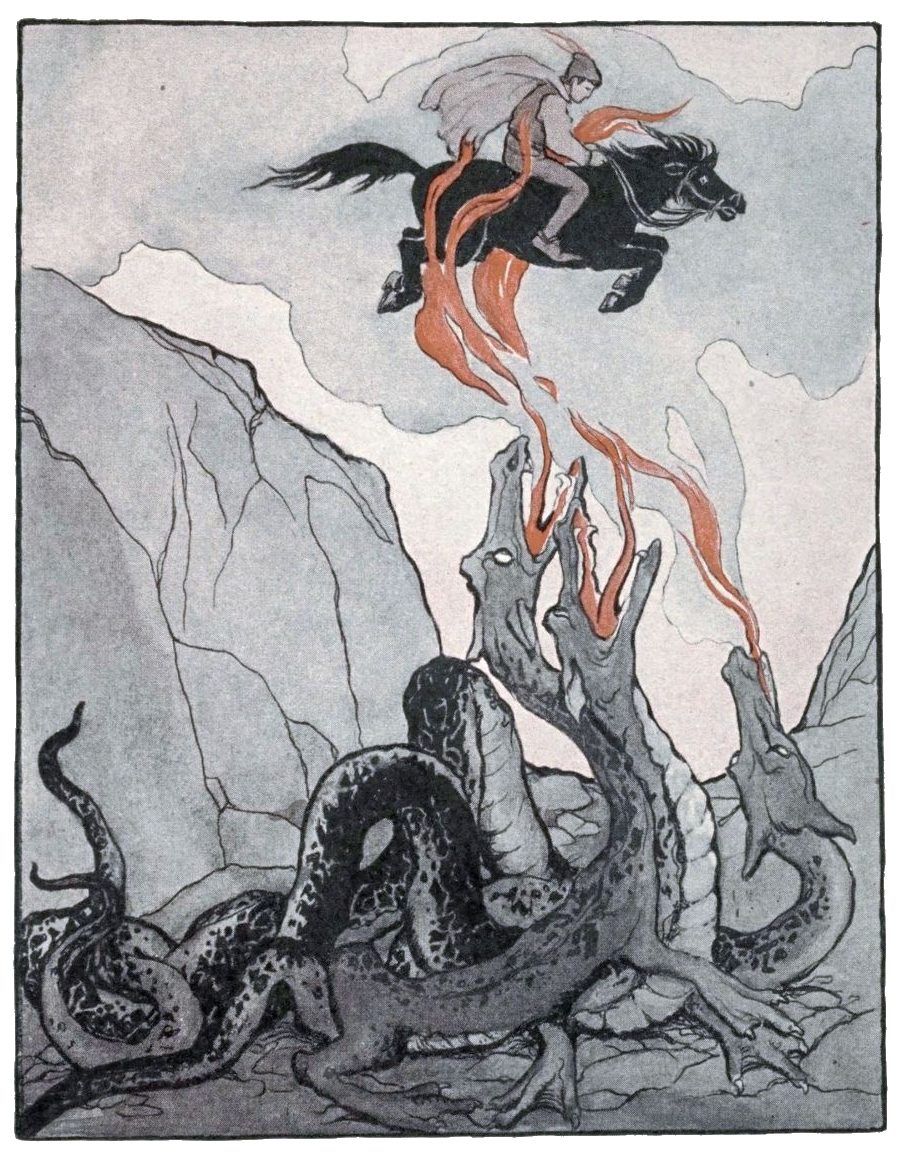
When horse and rider approached them, the serpents straightened and opened their fiery jaws, and rushed upon Conn-eda and his horse as if to devour them; but the prince was ready. As the horse sprang over them, Conn-eda threw a piece of flesh into each of the flaming mouths, and he didn’t miss a single one.
Immediately the serpents were sated, and their heads sank down, and they lay again on the ground as if asleep.
The horse landed far behind them on the causeway, and Conn-eda held the reins lightly.
“Conn-eda, are you still straddling my back?”
“I am,” replied the prince.
“Now I realize that you are a noble and heroic prince,” said the steed, “and I am hopeful that we will conquer all our adventures with a great reward for both of us at the end.”
Then they went on, and on they went until they came to a flaming mountain, and the heat of it was very great.
“Are you sitting firmly on my back?” asked the shaggy black horse.
“I am sitting firmly,” replied the prince.
“Then don’t move. Don’t look to the right, not to the left, not up or down, because I’m going to jump over the mountain, and if my jump is interrupted even a hair’s breadth, we’ll both fall into the flames, and that shall be the end of us.”
When Conn-eda heard this, fear seized his heart, but he settled into the saddle, and when the horse sprang he remembered what had been said to him, and looked neither right nor left, nor up nor down, nor he moved but a hair’s breadth.
The good horse carried him across, but they were not quite high above the mountain when the flames came up and licked Conn-eda’s feet and his clothes.
“Are you still alive, Conn-eda?” asked the horse, as they settled on the other side of it.
“Barely,” replied Conn-eda, “for I’m very scorched.”
“That’s both good and bad news,” said the horse. “Good because you’re still alive, and bad because you’re so badly burned. Take the flask and rub some of its healing power on your burns and they’ll go away.”
Conn-eda did, and immediately his burns disappeared as if they had never been there, and skin was completely healthy again.
“The worst dangers are now over,” said the shaggy black horse, “but there are other things to be done which you may find difficult. Now mount and ride again, and I can tell you that we are not far from the palace of be the Water King.”
Conn-eda remounted, and they rode on. Then a castle came into view, with gleaming domes and turrets, and great golden gates.
Here the shaggy steed ordered the prince to shine the light again.
“Now, Conn-eda, listen well and answer honestly,” said the horse, “for on what happens next depends your fate as well as mine. So now tell me the truth, have I served you well?”
“No one could have served me better,” replied the prince.
“Did I save your life or did I risk it?”
“You saved it, and without you I would have lost it on the way.”
“And now the time has come to prove whether you are grateful or not. Put your hand in my ear and take the dagger you find there. Do not fear nor be afraid, but drive the dagger into my heart, for only thus can you reward me for what I have done for you.”
When the prince heard these words from the horse, he was filled with horror. “Never, never will I do something so cruel and mean,” he cried. “I’d rather stab the dagger in my own heart than in yours.”
“If you will not, you will not,” said the shaggy black horse, “but this I tell you plainly; if you do not, both you and I must perish.”
The horse continued talking, and finally Conn-eda agreed to do as he was asked.
“It’s all right,” cried the horse, as soon as the prince agreed. “And now I’ll tell you what to do next. Once you’ve put the dagger in me, peel off my skin and go in yourself. You’re then free to go in and out of the castle as you please, otherwise you would be killed by the people there the moment you enter. Go through the golden gate in the center and the first thing you will see is a splashing silver fountain. Fill the cup you found under the stone with this water and bring it back and sprinkle the water over me. Then all will be well. But oh, Conn-eda, hasten to go and come back, for as soon as you have left me the birds of prey will gather around me, and if they will tear me to pieces, and there will be no further help for me.”
Conn-eda promised to do whatever the steed told him to do, and then he put his hand in the horse’s ear and found the dagger it had told him about. But he trembled so much that he barely had the strength to even aim the dagger at the horse, let alone stab him. But this was all that was needed, for as soon as the dagger was turned to the horse, the dagger flew forward, carrying Conn-eda’s hand, and buried itself up to the hilt in the heart of the steed, so that he fell dead.
Then the prince wept bitter tears over his dead companion. After a while he got up and took the dagger to take the skin off, as he had promised; but cutting was not necessary, for as soon as he got hold of the hide it fell like a loose glove from the hand that was in it, and the hide was as soft and fine as if it had been tanned by the king of leather tanners.
Conn-eda hastened to the castle, as the horse had commanded him, and entered through the golden gate.
Inside was a large hall with many people walking around and guards at the door, but no one spoke to him or stopped him. In the middle of the hall was the splashing silver fountain of which the steed had told him, and here the prince hurried and filled his cup with water, and then ran back in the direction from whence he had come, to where the steed used to be.
He came just in time, for the birds of prey were already gathering and he had to fight them with his sword so he could drive them away.
Then he sprinkled the water from the cup on the body of the steed, and as soon as he had done this, a strange thing happened, for immediately the steed was gone, and in its place stood a young and handsome prince, and he was so tall and so noble in his appearance that Conn-eda had never seen one like him.
The young man came to Conn-eda and took him in his arms, and the tears streamed down his face, but they were tears of joy.
“Conn-eda,” he said, “you saved me from a hard and cruel fate, and I never thought I’d ever come back to my own form and live like other men. I am the brother of the Water King , and it was because of a cruel spell that I was forced to walk about in the guise of a shaggy little black horse The spell held me, and only if someone would ride me back to the castle and kill me through true love and sprinkle me with water from the fountain, the spell would be broken. This you have done for me, Conn-eda, and I shall never forget what I owe you. And now return with me to my brother’s castle, so that he may welcome you.”
So Conn-eda and his companion went back to the castle, and there the joy was so great that it was unimaginable, for the spell was broken, and the young prince was returned to his kingdom.
The Water King welcomed Conn-eda and gladly promised him the golden apples, the great black horse and the magical hound Samur. Nothing would he have denied Conn-eda for saving his brother from his spell.
A great banquet was prepared and there was shouting and cheering, and the Water King begged Conn-eda to stay there until the time allotted to him for his quest was almost over.
To this the prince gladly consented, and he remained there with the Water King and his brother until nearly a year and a day had passed, and then he departed for his father’s kingdom. He rode on the great black horse, and in his bosom he carried the golden apples, and the wizard dog Samur ran beside him. He drove and now the way was clear and nothing stopped him. So he came back to his house, and there, on the high tower, the wicked queen still sat, pricking wheat with her spinning rod.
Though it had been a hard year, her heart rejoiced, for she had no doubt that Prince Conn-eda was dead and her own son would reign in the kingdom. And then, on the last day of the wager, she looked out of the tower where she sat, and Conn-eda rode up on the black horse, with the dog beside him, and she guessed correctly that he also had the apples with him.
Then her anger and fear were so great that she threw herself down from the tower and perished miserably.
Conn-eda sent for the hen-wife, who was actually a princess, and when he saw her she was so fair and honorable, and so tender, too, that his heart went out to her, and he wanted nothing more than to marry her.
To this she consented, and they were married in great splendour. The Water King and his brother came to the wedding, and the third prince, who had lived near her, was given a high position in the court, and so they all lived forever in great love and happiness!

